- HOME
- ABOUT ME
- movies
- MEDIA
- L.Onerva
- Eino Leino
- Eeva-Liisa Manner
- Erään Opon päiväkirja
- Elämänkenttäni
- Elämäni ”viiva”
- Käyttöteoriani – se miten minä ohjaan
- Kulttuuritietoinen ja kansainvälistyvä ohjaus
- Ohjauksen järjestäminen maahanmuuttajakoulutuksessa
- Ohjauksen yhteiskunnallinen viitekehys
- Ohjaukäsite
- Oma opiskeluorientaatio
- Opiskelijoiden yksilöllisyys ohjauksessa
- EETTISET KYSYMYKSET
- Psykososiaalisen kehityksen teoria
- Suhteeni erilaisuuteen ja tehtäväni opinto-ohjaajana
- Opinto-ohjauksen ja erityisopetuksen yhtäläisyyksiä ja eroja
- Kehitykseni opinto-ohjaajana
- Maahanmuuttajan uraohjaus
- Maahanmuuttajien ohjaus ja neuvonta: kuka, mitä, miten?
- Ohjauksen tulevaisuus
- Elämänkenttäni
- Mariana Marin
- Claudiu Komartin
- Mariana Codrut
- Roland Erb
- Romanian poetry
- ESSAYS
- STORIES
- CLASSIC POETRY
- CONTEMPORARY POETRY
- TRANSLATED POEMS
- READING POETRY
- CONTACT
- translated Italian-English
- translated Italian-Romanian
- translated Spanish-English
- translated Spanish-Romanian
classic poetry
UNENDING LOVE / IUBIRE FARA SFARSIT
POSTED IN classic poetry June 19, 2022
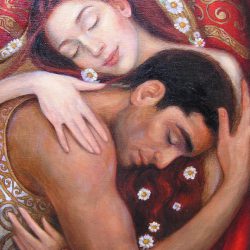
UNENDING LOVE / IUBIRE FARA SFARSITI seem to have loved you in numberless forms, numberless times…
In life after life, in age after age, forever.
My spellbound heart has made and remade the necklace of songs,
That you take as a gift, wear round your neck in your many forms,
In life after life, in age after age, forever.Whenever I hear old chronicles of love, its age-old pain,
Its ancient tale of being apart or together.
As I stare on and on into the past, in the end you emerge,
Clad in the light of a pole-star piercing the darkness of time:
You become an image of what is remembered forever.You and I have floated here on the stream that brings from the fount.
At the heart of time, love of one for another.
We have played along side millions of lovers, shared in the same
Shy sweetness of meeting, the same distressful tears of farewell-
Old love but in shapes that renew and renew forever.Today it is heaped at your feet, it has found its end in you
The love of all man’s days both past and forever:
Universal joy, universal sorrow, universal life.
The memories of all loves merging with this one love of ours –
And the songs of every poet past and forever.
RABINDRANATH TAGORE…………………
IUBIRE FĂRĂ SFÂRȘIT
Se pare că te-am iubit în nenumărate forme, de nenumărate ori…
Viață după viață, vârstă după vârstă, pentru totdeauna.
Inima mea vrăjită a făcut și refăcut colierul de cântece,
Pe care tu îl iei ca pe un dar și îl porți la gât în multiplele tale forme,
Viață după viață, vârstă după vârstă, pentru totdeauna.Ori de câte ori aud cronici vechi de dragoste, durerea ei de veacuri,
Povestea ei veche de a fi despărțiți sau împreună.
Când privesc indelung trecutul, în cele din urmă apari tu,
Imbrăcată în lumina unei stele polare care străpunge întunericul timpului:
Tu devii o imagine a ceea ce este amintit pentru totdeauna.Tu și cu mine am plutit aici pe pârâul care aduce de la izvor.
În inima timpului, dragostea unuia pentru altul.
Ne-am jucat alături de milioane de îndrăgostiți, am împărțit aceeași
timidă dulceață a întâlnirii, aceleași lacrimi de adio îndurerate…
Iubire veche dar în forme ce se înnoiesc și se înnoiesc mereu.Azi e îngrămădită la picioarele tale, și-a găsit sfârșitul în tine
Iubirea tuturor zilelor omului deopotrivă trecute și veșnice:
Bucuria universală, durerea universală, viața universală.
Amintirile tuturor iubirilor care se contopesc cu această unică iubire a noastră –
Și cântecele tuturor poeților trecuți și veșnici.trad. M. M. Biela
CERCA DEL AQUA TE QUIERO LLEVAR / NEAR THE WATER I WANT TO BRING THEE / APROAPE DE APA AS VREA SA TE-ADUC
POSTED IN classic poetry June 17, 2022

CERCA DEL AQUA TE QUIERO LLEVAR / NEAR THE WATER I WANT TO BRING THEE / APROAPE DE APA AS VREA SA TE-ADUC
Cerca del agua te quiero llevar,
porque tu arrullo trascienda del mar.
Cerca del agua te quiero tener,
porque te aliente su vívido ser.
Cerca del agua te quiero sentir,
porque la espuma te enseñe a reír.
Cerca del agua te quiero, mujer,
ver, abarcar, fecundar, conocer.
Cerca del agua perdida del mar,
que no se puede perder ni encontrar.
MIGUEL HERNANDEZ…………….
NEAR THE WATER I WANT TO BRING THEE
Near the water I want to bring thee,
because your murmur transcends the sea.
Near the water to keep you I want,
for its vivid being makes you brave and blunt.
Near the water to feel you enough,
because the foam teaches you to laugh.
Near the water, woman, I’d like so
to see you, to hold you, to posed, to know.
Near the lost water of the sea proud,
that ever cannot be lost neither found.
………………..APROAPE DE APA AS VREA SA TE-ADUC
Aproape de apă sa te-aduc as vrea,
căci murmurul tau transcende marea.Aproape de apă sa te tin o viata,
căci ființa-i vie te face-ndrazneata.
Aproape de apă să te simt as tinde,
pentru că spuma te învață a rade.
Aproape de apa, femeie,-as dori
a te vedea, cuprinde, a te-avea, a te sti.
Aproape de apa pierdută a mării,
ce nu poti vreodata s-o lasi uitarii.
trad. M. M. Biela
ESEMPI / EXEMPLE / EXAMPLES
POSTED IN classic poetry June 16, 2022
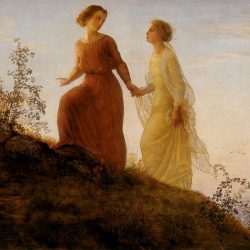
ESEMPI / EXEMPLE / EXAMPLESAnima, sii come il pino:
che tutto l’inverno distende
nella bianca aria vuota
le sue braccia fiorenti
e non cede, non cede,
nemmeno se il vento,
recandogli da tutti i boschi
il suono di tutte le foglie cadute,
gli sussurra parole d’abbandono;
nemmeno se la neve,
gravandolo con tutto il peso
del suo freddo candore,
immolla le fronde e le trae
violentemente
verso il nero suolo.
Anima, sii come il pino:
e poi arriverà la primavera
e tu la sentirai venire da lontano,
col gemito di tutti i rami nudi
che soffriranno, per rinverdire.
Ma nei tuoi rami vivi
la divina primavera avrà la voce
di tutti i più canori uccelli
ed ai tuoi piedi fiorirà di primule
e di giacinti azzurri
la zolla a cui t’aggrappi
nei giorni della pace
come nei giorni del pianto.
Anima, sii come la montagna:
che quando tutta la valle
è un grande lago di viola
e i tocchi delle campane vi affiorano
come bianche ninfee di suono,
lei sola, in alto, si tende
ad un muto colloquio col sole.
La fascia l’ombra
sempre più da presso
e pare, intorno alla nivea fronte,
una capigliatura greve
che la rovesci,
che la trattenga
dal balzare aerea
verso il suo amore.
Ma l’amore del sole
appassionatamente la cinge
d’uno splendore supremo,
appassionatamente bacia
con i suoi raggi le nubi
che salgono da lei.
Salgono libere, lente
svincolate dall’ombra,
sovrane
al di là d’ogni tenebra,
come pensieri dell’anima eterna
verso l’eterna luce.
ANTONIA POZZI
Antonia Pozzi, Pasturo 10 Aprile 1931
…………………
EXEMPLE
Suflete, fii precum pinul:
care toată iarna își întinde
brațele înfloritoare
în vazduhul alb și gol
și nu cedează, nu cedează,
nici dacă vântul,
aducându-i din toate pădurile
sunetul tuturor frunzelor căzute,
îi șoptește cuvinte de abandon;
nici dacă zăpada,
împovărându-l cu toată greutatea
albului ei rece,
îmbibă frunzele și le taraste
cu violență
spre negrul pământ.
Suflete, fii precum pinul;
și atunci va veni primăvara,
și-o vei simti venind de departe,
cu geamatul tuturor ramurilor goale
care vor suferi, spre-a înverzi.
Dar în ramurile tale vii,
primavara divina va avea glasul
celor mai cântătoare pasari,
iar la picioarele tale
bulgarele de care te agăți
în zilele de liniste
precum în zilele de plâns
va înflori cu primule si zambile albastre.
Suflete, fii precum muntele:
care atunci când toată valea
este un mare lac de violete
și atingerile clopotelor ies
ca nuferi albi ai sunetului,
el singur, în înălțime, se intinde
la o discutie mută cu soarele.
Umbra il invaluie
din ce in ce mai strans
și pare, în jurul frunții sale înzăpezite,
un păr greu
care-l rastoarna,
care-i impiedica saltul aerian
spre iubirea lui.
Dar dagostea soarelui
il înconjoara cu pasiune,
de-o splendoare supremă,
saruta patimas
cu razele sale norii
care se ridică din el.
Ei se ridica liberi, incet
eliberati de umbră,
suverani
dincolo de orice întuneric,
precum gândurile sufletului etern
catre lumina vesnica.
…………………
EXAMPLESSoul, be like the pine:
that all winter long stretches
its flourishing arms
in the empty white air
and does not yield, does not yield,
not even if the wind,
bringing to him
the sound of all the fallen leaves
from all the woods,
whispers to him words of abandonment;
not even if the snow,
burdening him with all the weight
of its cold whiteness,
soaks the leaves and drags them
violently
towards the black ground.
Soul, be like the pine:
and then spring will come,
and you will feel it coming from afar,
with the groaning of all the bare branches
that will suffer, to be green again.
But in your living branches
the divine spring will have the voice
of all the most songful birds,
and at your feet the clod
to which you cling
in the days of peace
as in the days of weeping
will blossom
with primroses and blue hyacinths.
Soul, be like the mountain:
that when the whole valley
is a great lake of violets
and the touches of the bells emerge
like white water lilies of sound,
he alone, above, tends
to a silent conversation with the sun.
The shadow wraps him
closer and closer
and it seems, around his snowy forehead,
a heavy hair
that overturns him,
preventing him
from leaping airily
towards his love.
But the sun’s love
passionately encircles him
with a supreme splendour,
passionately kisses
with its rays the clouds
that rise from him.
They ascend free, slow,
free of shadow, sovereign
beyond all darkness,
like thoughts of the eternal soul
towards the eternal light.
trad. M. M. Biela
COSA FAI SEDUTO SULLA PORTA DI CASA / WHAT ARE YOU DOING SITTING ON THE DOORSTEP / CE FACI STAND IN PRAG
POSTED IN classic poetry June 13, 2022
COSA FAI SEDUTO SULLA PORTA DI CASA / WHAT ARE YOU DOING SITTING ON THE DOORSTEP / CE FACI STAND IN PRAG
Cosa fai seduto sulla porta di casa
come un sorvegliante di orizzonti?
Sto badando al tramonto.
Pregusto quest’ora scorsoia.
I suoi ultimi suoni arancio e d’uva.
Quest’alcol incerto tra l’acqua e il vino.
E ho il trasalimento
di questa radenza di luce.
Il rarefarsi di questa erranza.
L’occhio si sfinisce d’ammirare.
Sicuro di non avere sciupato il tempo.
Il giorno muore senza destare stupore.
Mentre il suo aroma si sperde e lo perdo
da quest’angolo e mezzo di passaggio.
Ho accompagnato un eucalipto al suo posto.
Senti stormisce l’occidente
stremato al divenire.
Senti che fioriture danno i crepuscoli.
Rinasco camminando con questi addii
che si allontanano creando dei mondi.
PIERO LO IACONO……………….
WHAT ARE YOU DOING SITTING ON THE DOORSTEP
What are you doing sitting on the doorstep
like a guardian of horizons?
I am watching the sunset.
I long for this last hour.
Its last orange and grape sounds.
This uncertain alcohol between water and wine.
And I have the wince
of this radiance of light.
The rarefaction of this wandering.
The eye is exhausted with admiration.
Sure that I have not wasted the time.
The day dies without arousing astonishment.
While its aroma dissipates and I lose it
from this corner and a half of passage.
I accompanied an eucalyptus in its place.
Feel the west rustling
exhausted by becoming.
Feel what blooms the twilights give.
I am reborn walking with these farewells
that recede creating worlds.……………….
CE FACI STAND IN PRAG
Ce faci stând în prag
ca un supraveghetor al orizonturilor?
Privesc apusul.
Aștept cu nerăbdare această ultimă oră.
Cele mai recente sunete de portocale și struguri.
Acest alcool incert între apă și vin.
Și sunt surprins
de asta strălucire a luminii.
Rarefierea acestei rătăciri.
Ochiul este obosit de admiratie.
Sigur că nu am pierdut timpul.
Ziua moare fără să trezească uimire.
În timp ce aroma i se risipeste și eu o pierd
din acest colţ şi jumătate de trecere.
Am însoțit un eucalipt la locul lui.
Simti Occidentul fosnind
epuizat intru devenire.
Simți ce flori dau amurgurile.
Renasc mergând cu aceste “rămas-bun”
care pleacă creând lumi.trad. M. M. Biela
SCRIVO / SCRIU / I WRITE
POSTED IN classic poetry June 12, 2022
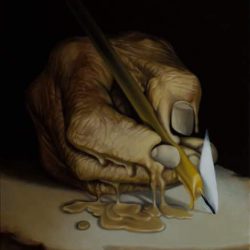
SCRIVO / SCRIU / I WRITEScrivo con gli occhi chiusi
e gli occhi aperti.
Con le orecchie tappate
e spalancate.
Scrivo con le narici a ventosa
come fori cavernosi
e coi pori all’attenti.
Scrivo senza perché né per chi.
Anche se è un sasso,
uno scarafaggio o una foglia
a cominciare il suo canto.
Scrivo perché c’é carta e penna
tra i ritagli di tempo
e un cuore in canna.
E scrivo finché non c’è
più luce sulla pagina.
Converso con il verso,
mi ci converto,
lo inverto e mi diverto,
ma vi avverto
il mio terrore è aver parlato
di niente con nessuno.
Scrivo perché non riuscirei
a riposare la testa
su un trambusto di fogli bianchi.
E solo così finalmente mi fermo
ad ascoltare il silenzio in pace
e lo lavoro per farlo voce,
cavità di munifica perla
senza noiosi inventari.
Scrivo come un impulso
a voler salvare qualcosa.
Un’urgenza di esistenza.
Nella speranza che un tu
si accosti e dia un’occhiata
pur sapendo che mi getterà
dopo avermi letto male
e in tutta fretta.
Oh potessi scrivere senza
sperare che nessuna legga!
Scrivo e redimo i miei demoni
e la miriade dei miei alter ego.
Più vergogna sarebbe il non darsi
da fare per liberarsene.
Scrivere mi solleva al di sopra del suolo
e forse rende me e il mondo un po’ migliori,
ma non nutro grandi illusioni.
È uno sporco lavoro
e qualcuno deve pur farlo.
Oh se riuscissi a vivere
cosa m’importerebbe di scrivere!
PIERO LO IACONOQuadro di MIHAI CRISTE, The Epilogue, 2018
……………..
I WRITE
I write with my eyes closed
and my eyes open.
With my ears plugged
and wide open.
I write with nostrils flaring
like cavernous holes
and pores at attention.
I write without why or for whom.
Even if it is a stone,
a beetle or a leaf
that begins its song.
I write because there is pen and paper
between the scraps of time
and a heart in the barrel.
And I write until there is
more light on the page.
I converse with the verse,
To it convert,
I reverse it and have fun,
but I warn you
my terror is to have spoken
about anything to anyone.
I write because I could not
rest my head
on a hustle and bustle of blank sheets of paper.
And only then do I finally stop
and listen to the silence in peace
and work to make it voice,
cavity of munificent pearl
without boring inventories.
I write as an impulse
to save something.
An urgency of existence.
In the hope that a you
will approach and take a look
even knowing that you will throw me
after reading me wrongly
and in haste.
Oh that I could write without
hoping that no one would read!
I write and redeem my demons
and the myriad of my alter egos.
More shameful would be not
trying to get rid of them.
Writing lifts me above the ground
and perhaps makes me and the world a little better,
but I harbour no great illusions.
It is a dirty job
and someone has to do it.
Oh if I could live
what would I care to write!
Painting by MIHAI CRISTE, The Epilogue, 2018………………
SCRIU
Scriu cu ochii închiși
și cu ochii deschisi.
Cu urechile astupate
și larg deschise.
Scriu cu nările pufnind
ca niște găuri cavernoase
și porii în alerta.
Scriu fără de ce sau pentru cine.
Chiar dacă este o piatră,
un gândac sau o frunză
care își începe cântecul.
Scriu pentru că există hârtie și creion
între farame de timp
și o inimă în butoi.
Și scriu până nu mai e
lumină pe pagină.
Cu-n vers conversez,
La el ma convertesc,
Îl inversez și mă distrez,
dar va avertizez
teroarea mea este de-a fi vorbit
despre nimic cu nimeni.
Scriu pentru că nu-mi pot
odihni capul
pe o forfota de foi albe de hârtie.
Și doar asa mă opresc în sfârșit
spre-a asculta liniștit tacerea
și o muncesc spre-a o face să devină voce,
cavitate de perlă generoasa
fără inventare plictisitoare.
Scriu ca un impuls
spre a salva ceva.
O urgență de existența.
În speranța că un tu
se apropie și arunca o privire
chiar știind că mă va arunca
după ce m-a citit greșit
și în grabă.
O, de-aș putea scrie fără
sa sper că cineva va citi!
Sa scriu și sa-mi răscumpăr demonii
și multitudinea-mi de alter ego-uri.
Mai rușinos ar fi să nu incerci
a scăpa de ele.
Scrisul mă ridică deasupra pământului
și poate mă face pe mine și lumea putin mai buni,
dar nu-mi fac mari iluzii.
Este o muncă murdară
și cineva trebuie să o facă.
Oh, dacă aș putea trăi
ceea ce as vrea să scriu!
Pictură de MIHAI CRISTE, Epilogul, 2018
trad. M. M. Biela
THE BUTTERFLY / FLUTURELE
POSTED IN classic poetry May 18, 2022
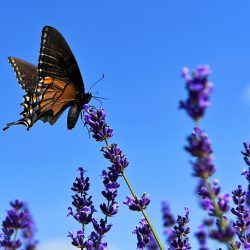
THE BUTTERFLY / FLUTURELE
The butterfly, an idle thing,
Nor honey makes, nor yet can sing,
— As do the bee and bird;
Nor does it, like the prudent ant,
Lay up the grain for times of want,
— A wise and cautious hoard.My youth is but a summer’s day:
Then like the bee and ant I’ll lay
— A store of learning by;
And though from flower to flower I rove,
My stock of wisdom I’ll improve,
— Nor be a butterfly.
ADELAIDE O’KEEFE
……………
FLUTURELE
Flutur, hoinar fara de tinta
Miere nu face, nici nu canta.
– Cum fac-albina, pasarea;
Nici ca furnica truditoare
Nu strange pentru vremi amare.
– Tezaur este firea.Junetea-i zi de vara, mica:
Apoi albina si furnica,
– Oi strange-nvatatura doar:
Și chiar de zbor din floare-n floare,
Intelepciunea-mi va fi mare,
– Nu fluture hoinar.
trad. M. M. Biela
EXKURS INS PFLANZENREICH: DIE ROSE DES PARACELSUS
POSTED IN classic poetry May 16, 2022
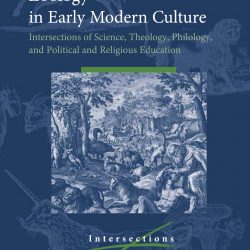
EXKURS INS PFLANZENREICH: DIE ROSE DES PARACELSUS.
DIE IDEE DER PALINGENESIE UND DIE DEBATTE UM DIE NATÜRLICHE AUFERSTEHUNG ZWISCHEN MITTELALTER UND NEUZEITBERND ROLING
EINLEITUNG
In einer seiner Parabeln mit dem schönen Titel „Die Rose des Paracelsus“ läßt der argentinische Schriftsteller Jorge Luis Borges einen Schüler die Studierstube des berühmten Naturphilosophen und Alchemisten Paracelsus betreten.1
Der junge Johannes Griesebach, so war sein Name, legt eine große Summe von Goldmünzen auf den Tisch, in der anderen Hand hält er eine Rose. Nach einem kurzen Wortwechsel, der schon ahnen lässt, dass der Schüler die Geheimnisse der Philosophie nicht durchdringen wird, fordert der junge Mann Paracelsus auf, einen Beweis zu erbringen, um den Wert seiner Lehren
zu beglaubigen. Paracelsus soll die Rose verbrennen und wiederauferstehen lassen. Borges lässt den Weisen eine mehrdeutige oder vielleicht auch eindeutige Antwort geben: Glaubst Du, jemand könnte diese Rose vernichten? Hatte Adam im Paradies nur einen Grashalm vernichten können? Sind es nicht nur die Erscheinungen, die sich in Wirklichkeit verändern? Griesebach wirft die Rose in die Flammen, doch Paracelsus macht keine Anstalten, die Rose wieder aus ihrem Staub erstehen zu lassen, weder durch ein magisches Wort, wie man hätte erwarten können, noch durch den Brennkoben seines Laboratoriums und besondere Instrumente. War Paracelsus also ein Scharlatan und Phantast, wie es den Schüler dünkt, der einen unendlichen Augenblick lang auf die neue Rose wartet?
Wie so viele der Geschichten des argentinischen Erzählers erscheint auch diese auf den ersten Blick wie ein Spiel mit Metaphern, eine Geschichte über den Glauben und den Unterschied zwischen wahrer und falscher Erkenntnis. Gerade heute mag sie auch ein Lehrstücksein sein über die Ökonomisierbarkeit von Wissen, das in Module gepresst lieber evaluierbare Kompetenzen vermitteln möchte, als bis zur wirklichen Erkenntnis vorzudringen. Wie so oft in den Erzählungen Borges erkennt man jedoch auch, daß die geschilderten Begebenheiten nicht nur der Metaphysik als Bühne dienen sollten, sondern
mit tiefem Fachkenntnis durchsetzt waren, Fachwissen, auf das Borges für seine Leser nur noch anspielen musste. In den großen Forschungsbibliotheken der Welt konnte sich der Dichter seiner Mitverschworenen sicher sein; die anderen hatten ihn vielleicht nie interessiert.
Die Rose war keine Erfindung des Romanciers, sondern sollte ebenso eine Theorie bezeugen, wie sie ihre praktischen Umsetzung unter Beweis stellte.
Sie dokumentierte die Möglichkeit einer natürlichen Auferstehung, die nicht nur Pflanzen betraf, sondern auch den Menschen und seinen Körper miteinschließen musste. Diese Möglichkeit einer natürlichen Wiederstellung, die man vor allem im 17. Jahrhundert als Palingenesie bezeichnen konnte, soll hier im folgenden Thema sein. Drei Dinge sollen zu diesen Zweck geleistet werden.
Zunächst werden die für die christlichen Konfessionen verbindliche Lesart der Auferstehung rekonstruiert, wie sie die Theologie des Hochmittelalters etwa ab dem 13. Jahrhundert hatte etablieren können. In einem zweiten Schritt sollen Autoren vorgestellt werden, die im Mittelalter tatsächlich die Möglichkeit einer natürlichen Auferstehung gelehrt haben. Der dritte Teil wird dann den Gelehrten gebühren, die in die Tat umsetzen konnten, was die Theologie zuvor nur als Option proklamiert hatte, die Auferstehung. Wir werden sehen, daß sich diese Praktiker der leiblichen Wiederherstellung in ihren Versuchsanordnungen tatsächlich bis zum Menschen emporarbeiten konnten.…..
1. Ich danke der Alten Abteilung der Staats- und Universitätsbibliothek Göttingen, der
Staatsbibliothek Berlin und dem Thomas-Institut der Universität Köln für ihre Hilfe bei der
Erstellung dieser Studie. Ein Teil ihrer Thesen wurden auf Vorträgen in Göttingen, Innsbruck
und Prag diskutiert; allen Diskutanten sei ebenfalls herzlich gedankt. Gewidmet ist diese
Arbeit Magdalena Biela-Nastase (Riihimäki/Finnland).2. Borges Jorge Luis, „La rosa de Paracelso“, in Obras completas, 4 vols. (Barcelona: 1996), vol. III,
387–389. Deutsch als Borges Jorge Luis, „Die Rose des Paracelsus“, in Erzählungen 1975–77
(Gesammelte Werke, vol. IV), übersetzt von D.E. Zimmer (München: 1982) 105-108
………………………..
EXCURSION INTO THE PLANT KINGDOM: PARACELSUS’ ROSE.
THE IDEA OF PALINGENESIS AND THE DEBATE ON NATURAL RESURRECTION BETWEEN THE MIDDLE AGES AND MODERN TIMESBERND ROLING
INTRODUCTION
In one of his parables with the beautiful title “The Rose of Paracelsus”, the Argentinian writer Jorge Luis Borges has a student enter the study of the famous natural philosopher and alchemist Paracelsus.1
The young Johannes Griesebach, that was his name, places a large sum of gold coins on the table, holding a rose in his other hand. After a brief exchange of words, which already foreshadows that the student will not penetrate the mysteries of philosophy, the young man asks Paracelsus to produce proof which could authenticate the value of his teachings. Paracelsus is told to burn the rose and resurrect it. Borges has the wise give an ambiguous or perhaps unambiguous answer: Do you think anyone could destroy this rose? Was Adam only able to destroy a blade of grass in paradise? Is it not only the appearances that change in reality? Griesebach throws the rose into the flames, but Paracelsus makes no effort to make the rose rise again from its dust, neither by a magic word, as one might have expected, nor by the burning chamber of his laboratory and special instruments. Was Paracelsus, then, a charlatan and a fantasist, as it seemed to the student who waits an interminable moment for the new rose?
Like so many of the stories of the Argentinian narrator, this one too appears at first glance to be a play with metaphors, a story about faith and the difference between true and false knowledge. Today in particular, it may also be a lesson about the economisation of knowledge, which, pressed into modules, would rather impart valuable competences than penetrate the real knowledge. As is so often the case in Borges’ stories, however, one also recognises that the incidents described were not only meant to serve as a stage for metaphysics, but were interspersed with deep expertise, specialised knowledge that Borges only had to allude to for his readers. In the great research libraries of the world, the poet could be sure of his co-conspirators; the others had perhaps never interested him.
The rose was not an invention of the novelist, but was as much intended to testify to a theory as it was to prove its practical implementation.
It documented the possibility of a natural resurrection, which did not only concern plants but also had to include the man and his body. This possibility of a natural resurrection, which could be called palingenesius, especially in the 17th century, will be the subject of the following. Three things are to be done to this end.
First, the reading of the resurrection that was binding for the Christian denominations will be reconstructed, as the theology of the High Middle Ages had been able to establish it from about the 13th century onwards. In a second step, authors will be presented who actually taught the possibility of a natural resurrection in the Middle Ages. The third part will then be devoted to the scholars who were able to put into practice what theology had previously only proclaimed as an option, the resurrection. We will see that these practitioners of bodily restoration were actually able to work their way up to the human being in their experimental arrangements.1. I would like to thank the Old Department of the Göttingen State and University Library, the Berlin State Library and the Thomas Institute of the University of Cologne for their help in preparing this study. Some of their theses were discussed at lectures in Göttingen, Innsbruck and Prague; my sincere thanks also go to all the discussants.
This work is dedicated to Magdalena Biela-Nastase (Riihimäki/Finland).2. Borges Jorge Luis, “La rosa de Paracelso”, in Obras completas, 4 vols. (Barcelona: 1996), vol. III, 387-389. German as Borges Jorge Luis, “Die Rose des Paracelsus”, in Erzählungen 1975-77 (Gesammelte Werke, vol. IV), translated by D.E. Zimmer (Munich: 1982) 105-108.
PROF. DR. BERND ROLING
THE AMULET / TALISMANUL
POSTED IN classic poetry May 16, 2022
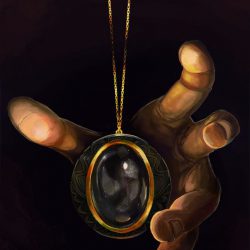
THE AMULET / TALISMANULYour picture smiles as first it smiled,
The ring you gave is still the same,
Your letter tells, O changing child,
No tidings since it came.Give me an amulet
That keeps intelligence with you,
Red when you love, and rosier red,
And when you love not, pale and blue.Alas, that neither bonds nor vows
Can certify possession;
Torments me still the fear that love
Died in its last expression.RALPH WALDO EMERSON
………………..
TALISMANUL
Poza-ti zambeste tot la fel,
Acelasi e inelul dat,
Scrisoarea-ti, schimbator copil,
Vesti noi, de când veni, n-a dat.Să-mi dai un talisman
Care s-arate ce simti tu,
Roșu si roz, cand tu iubesti
Palid si-albastru atunci cand nu.Vai, nici un fel de juraminte
Destinul nu vor izbavi;
Tare mi-e teama că iubirea
Demult muri.
trad. M. M. Biela
Franciscae meae Laudes / Francescai laudele mele
POSTED IN classic poetry May 3, 2022

Franciscae meae Laudes / Francescai laudele meleNovis te cantabo chordis
O novelletum quod ludis
In solitudine cordisEsto sertis implicata
O femina delicata
Per quam solvuntur peccata !Sciut beneficum Lethe
Hauriam oscula de te
Quae imbuta es magneteQuum vitiorium tempestas
Turbabat omnes semitas
Apparuisti, Deitas.Velut stella salutaris
In naugragilis amaris…
Suspendam cor tuis aris !Piscina plena virtutis
Fons aeternae juventutis
Labris vocem redde mutis !Quod erat spurcum, cremasti
Quod rudius, exaequasti :
Quod debile, confirmastiIn fame mea taberna
In nocte mea lucerna
Recte me semper guberna.Adde nunc vires viribus
Dulce balneum suavibus
Unguentatum odoribusMeos circa lumbos mica,
O castitatis lorica
Aqua tincta seraphicaPatera gemmis corusca
Panis salsus, mollis esca
Divinum vinum, FranciscaCHARLES BAUDELAIRE
——————
Francescai laudele mele
Pe coarde noi slava-ti scriu
Vlastaras frematand viu
In al inimii pustiu.De ghirlande-mpresurata
O, femeie delicata
Absolvita, far’ de pata.Te-as picta in sarutari
precum Lethé-n desfatari
ca un magnet dai vibrari.Cand furtuna de pacate
a spalat caile toate
tu aparusi, zeitate.Precum steaua salvatoare
in naufragii amare
inima-mi-iti facu altare.Havuz de virtute plina
tineret-etern senina
da-mi buzelor vorba plina!Ce fu infam, foc ai dat ;
Ce vulgar, ai aplanat
Ce debil, ai confirmat.In foame mi-ai fost mancare ;
In noapte lumina mare
Ghideaza-ma pe carare.Forta da-n taria toata
dulce baie parfumata
Miros suav aromata !Talie de foc luceasca
Neprihanita cereasca
Gust de apa ingereasca.Cristal taiat in corusca,
Paine sarata pe-o fresca
Vinul meu divin, Francisca!
M. M. Biela
NO SWAN SO FINE / KEIN SCHWAN SO FEIN / NICI O LEBĂDĂ ATÂT DE FRUMOASA
POSTED IN classic poetry April 27, 2022
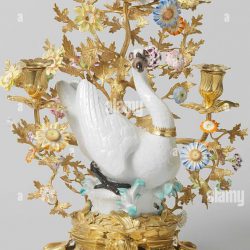
NO SWAN SO FINE / KEIN SCHWAN SO FEIN / NICI O LEBĂDĂ ATÂT DE FRUMOASA“No water so still as the
dead fountains of Versailles.” No swan,
with swart blind look askance
and gondoliering legs, so fine
as the chinz china one with fawn-
brown eyes and toothed gold
collar on to show whose bird it was.Lodged in the Louis Fifteenth
candelabrum-tree of cockscomb-
tinted buttons, dahlias,
sea-urchins, and everlastings,
it perches on the branching foam
of polished sculptured
flowers—at ease and tall. The king is dead.MARIANNE MOORE
…………
NICI O LEBĂDĂ ATÂT DE FRUMOASA
“Nici o apă atât de calma precum
fântânile moarte de la Versailles.” Nici o lebădă,
cu o privire neagra incremenita oblic
și picioare de gondolier, la fel de frumoasa
ca cea din portelanul de chinz, cu ochii caprui
și gulerul de aur dantelat,
pentru a arata cui apartine.Gazduita în candelabrul-copac
al lui Ludovic al XV-lea
cu nasturi de nuanta celosia,
cu dalii, cu scoici de mare, și vesnicii,
se așează pe spuma ramificată
a florilor sculptate lustruite –
confortabila și înalta. Regele este mort.……………
KEIN SCHWAN SO FEIN
„Kein Wasser so still wie der
tote Brunnen von Versailles. “Kein Schwan,
mit finsterem, blindem Blick schief
mit gondolierehaften Beinen, so fein
wie das Chinz-Porzellan mit reh-
braunen Augen und gezahntem Gold
mit einem Halsband, um zu zeigen, wessen Vogel er war.Untergebracht im Louis Quatorze
Kandelaber-Baum aus Hahnenkamm-
getönten Knöpfen, Dahlien,
Seeigeln und Strohblumen,
er sitzt auf dem sich verzweigenden Schaum
aus poliertem geformten
Blumen – bequem und groß. Der König ist tot.
trad. M. M. Biela

Copyright © 2023 by Magdalena Biela. All rights reserved.